中学生英语口语比赛-短文朗读材料教案资料
最新英语口语比赛七年级组朗读材料一知识分享
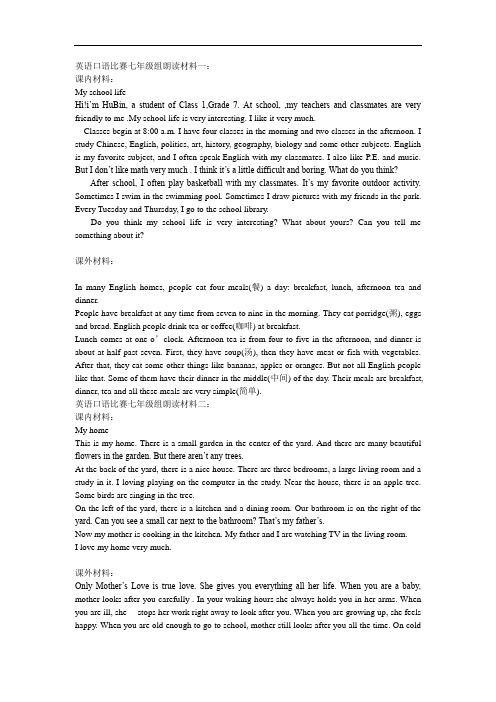
英语口语比赛七年级组朗读材料一:课内材料:My school lifeHi!i’m HuBin, a student of Class 1,Grade 7. At school, ,my teachers and classmates are very friendly to me .My school life is very interesting. I like it very much.Classes begin at 8:00 a.m. I have four classes in the morning and two classes in the afternoon. I study Chinese, English, politics, art, history, geography, biology and some other subjects. English is my favorite subject, and I often speak English with my classmates. I also like P.E. and music. But I don’t like math very much . I think it’s a little difficult and boring. What do you think?After school, I often play basketball with my classmates. It’s my favorite outdoor activity. Sometimes I swim in the swimming pool. Sometimes I draw pictures with my friends in the park. Every Tuesday and Thursday, I go to the school library.Do you think my school life is very interesting? What about yours? Can you tell me something about it?课外材料:In many English homes, people eat four meals(餐) a day: breakfast, lunch, afternoon tea and dinner.People have breakfast at any time from seven to nine in the morning. They eat porridge(粥), eggs and bread. English people drink tea or coffee(咖啡) at breakfast.Lunch comes at one o’clock. Afternoon tea is from four to five in the afternoon, and dinner is about at half past seven. First, they have soup(汤), then they have meat or fish with vegetables. After that, they eat some other things like bananas, apples or oranges. But not all English people like that. Some of them have their dinner in the middle(中间) of the day. Their meals are breakfast, dinner, tea and all these meals are very simple(简单).英语口语比赛七年级组朗读材料二:课内材料:My homeThis is my home. There is a small garden in the center of the yard. And there are many beautiful flowers in the garden. But there aren’t any trees.At the back of the yard, there is a nice house. There are three bedrooms, a large living room and a study in it. I loving playing on the computer in the study. Near the house, there is an apple tree. Some birds are singing in the tree.On the left of the yard, there is a kitchen and a dining room. Our bathroom is on the right of the yard. Can you see a small car next to the bathroom? That’s my father’s.Now my mother is cooking in the kitchen. My father and I are watching TV in the living room.I love my home very much.课外材料:Only Mother’s Love is true love. She gives you everything all her life. When you are a baby, mother looks after you carefully . In your waking hours she always holds you in her arms. When you are ill, she stops her work right away to look after you. When you are growing up, she feels happy. When you are old enough to go to school, mother still looks after you all the time. On coldwinter days, she always tells you to put on more clothes. She always stands in the wind waiting for you to come back from school. When you leave home for school with little breakfast, she always feels worried about you at home. She usually knows about your study and spends much money on your school things. When you do well in the exam, you will see the happiest smile on her face. We should remember Mother’s Love forever(永远).英语口语比赛七年级组朗读材料三课内材料:Keeping Safe on the StreetsEvery year many people get hurt or lose their lives in traffic accidents. How can we keep safe when we are walking near the roads? First , we must obey the traffic rules. We must cross the street only when we see the green “walk” sign. Second, before we cross the road, we must stop and look both ways—look left , look right and look left again. Third, we must never play on the street. Last, it’s good to help children and old people cross the road. All of us should be very careful when we are walking near traffic.课外材料:Dear Kate,I am writing to you in English. I hope you can understand it.I love studying in London and I have many new friends. Most of them are my classmates. From Monday to Friday, we have Chinese, math, physics and P.E. in the morning. I like Chinese and physics, because they’re interesting. I don’t like math. It’s to o boring. At noon, I have to have lunch at school because my home is far from my school. We usually have two classes in the afternoon, art and politics. We finish our classes at 3:30 p.m. After school, my friends and I always play soccer on the playground. And then we go home by bus.On weekends, we have no classes. We often go to the park and sometimes we go to the movies in the evening. We see movies twice a month. I like some famous stars like Jackie Chan.Oh, I have no time to write more. Please write back soon.Best wishes,Wang Gang英语口语比赛七年级组朗读材料四:课内材料:Jane’s DayJane usually gets up at twenty past six. At seven o’clock, she has breakfast with her parents. She goes to school by bus at half past seven. Classes begin at eight. She has four classes in the morning.She has lunch at school at about twelve o’clock. She has two classes in the afternoon. After school, she often plays soccer with her classmates. At a quarter past five, she takes the subway home.She gets home at five thirty and had dinner a t seven o’clock. After dinner, she often does her homework and watches TV for a little while. She goes to bed at about a quarter to ten.课外材料:What do you often do on weekends?Some people like to stay at home. Other people like to go out and play sports. My friend Jack works in a factory on weekdays. On weekends, he always doesthe same thing. On Saturdays he washes his car and on Sundays he goes to a village with his family by car. His uncle and aunt have a farm there. It isn’t a big one. But there’s alw ays much work to do on the farm. The children run and play on the farm. Jack and his wife help their uncle in the field. At the end of the day, they have supper at his uncle’s home. And then they go home by car.英语口语比赛七年级组朗读材料五:课内材料:My name is Linda. I live in Yushancun. It’s a quiet community. There are many old people living here. Many families with young children live here, too. There are a lot of tall buildings and small gardens in our community. My home is in an apartment building. There are many shops and restaurants close to my home. There is a supermarket near Xinhua Bookstore. The parking lot and the train station are not far from here. And there is a community service center in our area. We can call it for help.课外材料:It’s five o’clock in the afternoon. The last class is over. Some students are going home and some students are going to the dining room.The football players are doing some exercise on the playground. Some students are swimming in the swimming pool. Others are warming up(做准备动作) near the pool. Many students love music. The members of the school band are practicing(练习) in the garden. In the computer room, there are some students playing computer games. In the library, some students are reading Ren’ai English Post.After-school activities(课外活动) are really fun.英语口语比赛八年级组朗读材料一课内材料:Beijing OperaBeijing Opera is our national operal .It came into being after 1790 and has over 200 years of history. Its music and singing came from Xipi and Erhuang in Anhui and Hu bei.There are four main roles in Beijing Opera: Sheng ,Dan, Jing and Chou. Beijing Opera is full of famous stories,beautiful facial paintings,wonderful gestures and fighting .It is an important part of Chinese culture. Beijing Opera used to be popular with old people ,while you ng people didn’t like it very much .However ,more and more young people ,and even some foreigners ,are becoming interested in it nowadays.课外材料:Xiao Ming is a middle school student. He is a good boy, and he studies very hard. But his family is very poor, because his mother got ill a few years ago, and his father has no job. He makes money by carrying goods for other people. Life is very hard for them, and sometimes Xiao Ming can’t afford the school things.When his teacher knew this, she called on her students to raise money for him. She asked them to bring their saving-money to help him. All the students are kind and friendly. They are very glad to do that. Xiao Ming is so thankful that he studies harder than before.英语口语比赛八年级组朗读材料课内材料:Dealing with SadnessNobody can be happy all the time.you may become unhappy sometimes,for example,when you fail an exam;or you may become sad when you lose one of you friends.It’s normal to have these feelings .If you don’t know how to deal with these problems,you may learn something from Jeff.Jeff almost went mad when his older brother was killed in a car accident.He refused to play soccer or go to the movies with his friends Instead,he just sat in his bedroom and didn't talk to anybody,even his parents.Jeff felt that the world was unfair.He wad quite angry with the driver because his car hit his brother,even though it was an accident.After a few months,Jeff began to understand it was useless to be angry.Now he still misses his brother,but he doesn’t hate the driver any longer.He is beginning to talk his parents and that makes them happy again.He no longer stays in his room by himself.Instead,he goes to the movies or plays sports with his friends.He is feeling better now.课外材料:One day a poor man was cutting a big piece of wood near a river. Suddenly his old axe (斧子) fell into the water. He felt very sad because he lost his only axe. Then all at once a beautiful fairy (仙女) came out and asked the man what the matter was.“I have lost my axe.” he said, “It fell into the water when I was cutting the wood.” The fairy showed him a gold axe and asked, “Is that yours?”“No.”said the man. The fairy then showed him a silver (银) axe and asked again, “Is this yours?”“No.”again answered the man.Then she showed him the old axe.“Yes, that is mine.”called out the happy man.“I know it well enough.”said the fairy, “I only wanted to see if you would tell me the truth, and now I’ll give you the gold axe and the silver axe besides (包括) your own one.”英语口语比赛八年级组朗读材料三课内材料:Money Raising in Canadian and American SchoolsIt is very common to raise money in Canadian and American schools,Students,teachers and parents have many special ways to raise money for field trips.Some school come up to with great ideas,such as “King or Queen for a Day”.It costs each student one dollar to buy a ticket for the draw.After all the tickets are sold,one ticket is drawn.The student with the winning ticket will be the king or queen for the next school day.When the student arriver in the morning,the headmaster greens him or her and carries the student’s books.The student sits in the headmaster’s chair for the day and even can use the headmaster’s cellphone to call home.At noon,the headmaster and other teachers older a special lunch and serve it to the student.课外材料:Jack is a twenty-year-old young man. Two years ago, when he finished middle school, he found work in a shop. Usually he works until ten o'clock in the evening. He is very tired when he gets home. After a quick supper he goes to bed and soon falls asleep. His grandma who lives downstairs is satisfied with him.One day, on his way home, he met Mary. They were both happy. He asked the girl to his house, she agreed happily. He bought some fruit and drinks for her. And they talked about their school, teachers, classmates and their future. They talked for a long time.“Have a look at your watch, please,”said the girl. “What time is it now?”“Sorry, something is wrong with my watch,”said Jack. “Where's yours?”“I left it at home.”Jack thought for a moment and found a way. He began to stamp his foot on the floor, “Bang! Bang! Bang!”The sound woke his grandma up. The old woman shouted downstairs, “It's twelve o'clock in the night, Jack. Why are you still jumping upstairs?”英语口语比赛八年级组朗读材料四、课内材料:Michael’s diary of his tirp to the Ming TombsSunday,March 28thIt was a fine day.Darren,KangKang and I got up early in the morning.Then we rode to the Ming Tombs after we checked our bikes and backpacks.After two and a half hours, we arrived at the Great Palace Gate.Inthe old days,even officials had to get off their horses to walk.But now we just paid 30 yuan and then rode our bikes along the 7-kilometer Sacred Way.There are many stone animals along the Way.I like them very much,especially the Qillin.It stands for peace in China.After we had lunch,we climbed up the Dragon and Phoenix Gate to take picturea.That was a big mistake,A guard came and shouted at us to get off.We all felt frightenend, so we got on our bikes and rode quickly toward the Tombs.While we were having fun exploring,Irealized Darren was lost.KangKang and I were very worried.We looked for him ererywhere.We even asked a guard for help.Thank goodness!We found him at last.We were so excited and happy when we met again.What a special trip!课外材料:One morning Mr. Black is driving in the country and looking for a small hotel. When he sees an old man on the side of the road, he stops his car and says to the old man, “I want to go to the Sun hotel .Do you know it?”“Yes,” the old man says. “I will show you the way.” He gets into Mr. Black’s car, and theydrive about twelve miles. When they come to a small house, the old man says, “Stop here.” Mr. Black stops and looks at the house.” But this isn’t a hotel,” he s ays to the old man.“No,”the old man answers. “This is my house. And I’ll show you the way to the hotel. Turn around(转回去)and go back nine miles. Then you’ll see the hotel.”英语口语比赛八年级组朗读材料五课内材料:A Bike AccidentBicycles are popular.Most people think bicycles are much safer than other vehicles. But sometimes bicycles do happen. They can bring us sadness and death .At about 4:15 yesterday afternoon in Caishikou Street, a young man was riding his bicycle very fast while listening to MP3.Meters away,there was a sharp turn to the left. But the young man didn’t slow down .Suddenly a truck came from the opposite direction. To avoild hitting the truck ,the young man ran into the wall and hurt his arm badly .The truck driver rushed to him ,called the 122 hotine and took him to the hospital .:课外材料:Many years ago, there was a family named Franklin. They lived in Boston. There were five girls and six boys in the family. On a January day in 1706 another baby boy was born. The boy’s mother and her husband gave the boy a name-Benjamin.Benjamin was the brightest of all the children. He could read when he was five and he could write by the time he was seven. When he was eight, he was sent to school.In school, Benjamin had been good at reading and writing but not good at maths.He read all his father’s books. And whenever (无论何时) he had a little money, he spent it on a book. He liked books. They told him how to do something. At that time he invented(发明)the paddles (桨形工具) for swimming.第四章土的渗流性和渗流问题一、填空题1.当渗流方向向上,且水头梯度大于临界水头梯度时,会发生流砂现象。
英文朗诵教案(一)
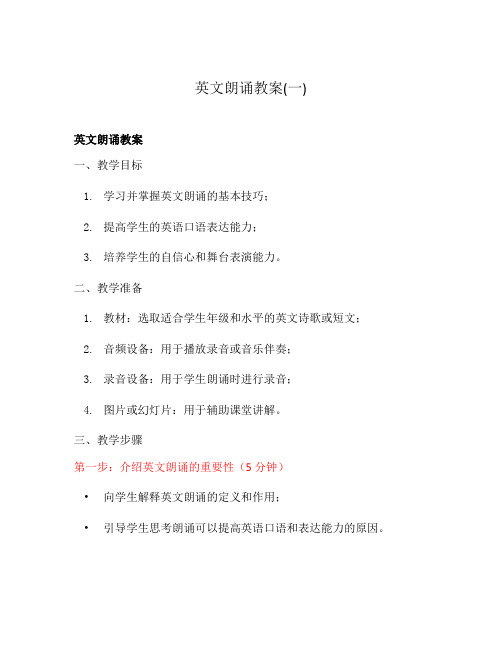
英文朗诵教案(一)英文朗诵教案一、教学目标1.学习并掌握英文朗诵的基本技巧;2.提高学生的英语口语表达能力;3.培养学生的自信心和舞台表演能力。
二、教学准备1.教材:选取适合学生年级和水平的英文诗歌或短文;2.音频设备:用于播放录音或音乐伴奏;3.录音设备:用于学生朗诵时进行录音;4.图片或幻灯片:用于辅助课堂讲解。
三、教学步骤第一步:介绍英文朗诵的重要性(5分钟)•向学生解释英文朗诵的定义和作用;•引导学生思考朗诵可以提高英语口语和表达能力的原因。
第二步:讲解英文朗诵的基本技巧(15分钟)1.发音和语调:–重点讲解英文发音中的元音、辅音、连读和重音;–引导学生注意英文朗诵中的语调和情感表达。
2.语速和停顿:–解释英文朗诵时的语速要慢于平常口语;–引导学生掌握适当的停顿和节奏感。
3.肢体语言和面部表情:–告诉学生肢体语言和面部表情对于朗诵的重要性;–演示正确的身体姿势和面部表情。
第三步:示范朗诵和学生模仿(15分钟)1.教师示范:–选择一段适合自己水平的英文诗歌或短文;–演示给学生一个优秀的英文朗诵范例。
2.学生模仿:–让学生分组,每组选择一位学生模仿教师示范的朗诵;–监听学生的朗诵并给予适当的反馈和指导。
第四步:个别指导和合作练习(20分钟)1.个别指导:–分别与学生进行一对一的朗诵指导,帮助他们克服困难和提高表现;–重点关注学生的发音、语调和停顿。
2.合作练习:–让学生自由合作,进行小组朗诵练习;–增加学生之间的互动和协作能力。
第五步:朗诵展示和评价(15分钟)1.朗诵展示:–让每个小组从中选出一位代表进行朗诵展示;–学生们互相欣赏和评价同伴的朗诵表演。
2.教师评价:–教师对每个小组的朗诵进行评价,并提供针对性的建议;–鼓励学生不断改进和提高。
四、课堂延伸1.家庭作业:–学生选择一篇自己喜欢的英文诗歌或短文进行朗诵,并录音;–学生可以在家中反复练习,直至达到满意的效果。
2.作品展示:–下节课时,让学生将家庭作业的朗诵作品带到课堂展示;–学生可以互相欣赏和评价作品,共同进步。
初中生英语朗读课文教案
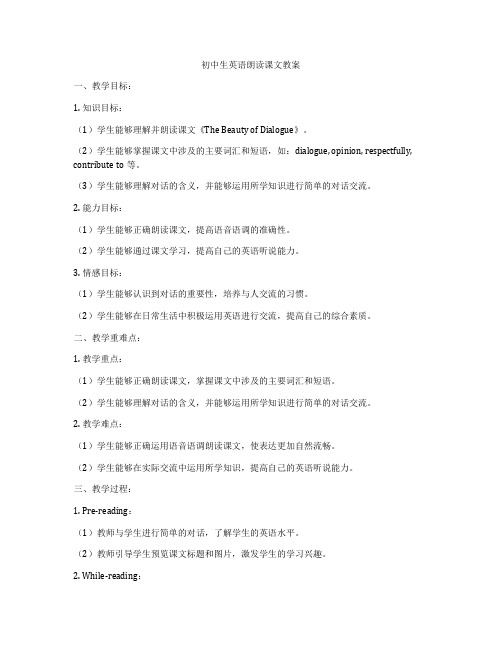
初中生英语朗读课文教案一、教学目标:1. 知识目标:(1)学生能够理解并朗读课文《The Beauty of Dialogue》。
(2)学生能够掌握课文中涉及的主要词汇和短语,如:dialogue, opinion, respectfully, contribute to等。
(3)学生能够理解对话的含义,并能够运用所学知识进行简单的对话交流。
2. 能力目标:(1)学生能够正确朗读课文,提高语音语调的准确性。
(2)学生能够通过课文学习,提高自己的英语听说能力。
3. 情感目标:(1)学生能够认识到对话的重要性,培养与人交流的习惯。
(2)学生能够在日常生活中积极运用英语进行交流,提高自己的综合素质。
二、教学重难点:1. 教学重点:(1)学生能够正确朗读课文,掌握课文中涉及的主要词汇和短语。
(2)学生能够理解对话的含义,并能够运用所学知识进行简单的对话交流。
2. 教学难点:(1)学生能够正确运用语音语调朗读课文,使表达更加自然流畅。
(2)学生能够在实际交流中运用所学知识,提高自己的英语听说能力。
三、教学过程:1. Pre-reading:(1)教师与学生进行简单的对话,了解学生的英语水平。
(2)教师引导学生预览课文标题和图片,激发学生的学习兴趣。
2. While-reading:(1)教师带领学生朗读课文,注意纠正学生的发音和语调问题。
(2)教师引导学生关注课文中的关键词汇和短语,解释其含义。
(3)教师提问学生,检查学生对课文内容的理解程度。
3. Post-reading:(1)教师组织学生进行小组讨论,让学生运用课文中的知识进行对话交流。
(2)教师选取小组代表进行汇报,分享交流成果。
(3)教师对学生的表现进行点评,鼓励学生积极运用英语进行交流。
四、作业布置:1. 学生回家后,请家长听孩子朗读课文,家长签字确认。
2. 学生抄写课文中的关键词汇和短语,加强记忆。
3. 学生结合课文内容,写一篇关于对话重要性的小短文。
高中英语口语诵读教案模板

课时:2课时年级:高一教学目标:1. 通过诵读,提高学生的英语口语表达能力。
2. 培养学生的语感和听力理解能力。
3. 培养学生自主学习和合作学习的能力。
教学重点:1. 诵读技巧的掌握。
2. 词汇和句型的积累。
教学难点:1. 学生在诵读过程中遇到的发音问题。
2. 学生在诵读过程中遇到的语调、节奏问题。
教学过程:第一课时一、导入1. 教师播放一段英语歌曲或电影片段,让学生感受英语口语的魅力。
2. 引导学生讨论:为什么英语口语如此重要?二、新课1. 教师讲解诵读技巧,如:发音、语调、节奏等。
2. 学生跟读练习,教师巡回指导。
三、巩固1. 学生分组,每组选择一首英文诗歌或短文进行诵读。
2. 小组内互相评价,教师点评。
四、总结1. 教师总结本节课的重点内容。
2. 学生分享自己的学习心得。
第二课时一、复习1. 教师提问:上一节课我们学习了哪些诵读技巧?2. 学生回答,教师点评。
二、新课1. 教师展示一些实用的英语口语表达,如:问候、介绍、感谢等。
2. 学生跟读练习,教师巡回指导。
三、巩固1. 学生分组,每组选择一个场景进行英语口语对话。
2. 小组内互相评价,教师点评。
四、拓展1. 教师推荐一些英语口语学习资源,如:英语口语教材、网络课程等。
2. 学生分享自己的学习计划。
五、总结1. 教师总结本节课的重点内容。
2. 学生分享自己的学习心得。
教学反思:1. 本节课通过诵读,提高了学生的英语口语表达能力。
2. 在教学过程中,要注意关注学生的发音、语调、节奏等问题,及时给予指导。
3. 鼓励学生多参与口语活动,提高他们的口语水平。
高中英语口语朗读教案
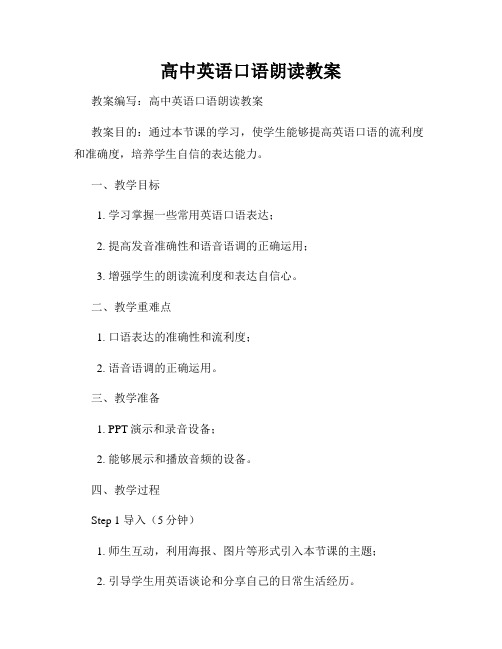
高中英语口语朗读教案教案编写:高中英语口语朗读教案教案目的:通过本节课的学习,使学生能够提高英语口语的流利度和准确度,培养学生自信的表达能力。
一、教学目标1. 学习掌握一些常用英语口语表达;2. 提高发音准确性和语音语调的正确运用;3. 增强学生的朗读流利度和表达自信心。
二、教学重难点1. 口语表达的准确性和流利度;2. 语音语调的正确运用。
三、教学准备1. PPT演示和录音设备;2. 能够展示和播放音频的设备。
四、教学过程Step 1 导入(5分钟)1. 师生互动,利用海报、图片等形式引入本节课的主题;2. 引导学生用英语谈论和分享自己的日常生活经历。
Step 2 学习常用口语表达(15分钟)1. 向学生介绍一些常用的口语表达,如问候、道歉、询问意见等;2. 播放相关的音频示范,引导学生模仿并进行口语练习;3. 分组练习,让学生在小组内互相对话,使用所学的口语表达进行交流。
Step 3 提高发音准确性(15分钟)1. 针对学生发音存在的问题,进行集体纠正;2. 利用发音示范和练习帮助学生纠正发音错误;3. 分角色朗读练习,提醒学生注意语音语调的正确运用。
Step 4 朗读练习(15分钟)1. 引导学生选择一篇短文进行朗读练习;2. 鼓励学生模仿音频进行朗读,注意语速和语调的自然流畅;3. 学生之间互相进行朗读表演,鼓励大胆表达。
Step 5 表达自信心(10分钟)1. 师生互动,通过鼓励学生的表达和练习,提高学生对口语表达的自信心;2. 分享成功的经历和感受,鼓励学生积极参与英语口语练习。
Step 6 小结与延伸(5分钟)1. 总结本节课所学的口语表达和发音要点;2. 布置作业,要求学生运用所学的表达进行日常口语交流。
五、教学反思通过本节课的教学,学生们在模仿和练习中提高了英语口语的表达能力。
通过多种形式的口语训练和练习,学生的自信心得到了增强。
为了更好地巩固学生的口语能力,教师可以鼓励学生多参与英语口语社交活动,加强口语训练的实践。
初中英语朗读短文教学设计

初中英语朗读短文教学设计引言:英语是一门国际通用的语言,在现代社会中具有重要的地位。
而培养学生的英语听说能力对于英语学习的全面提高至关重要。
在初中阶段,朗读短文是一种很好的提高学生英语口语表达能力的方式。
本文将介绍一种初中英语朗读短文的教学设计,旨在帮助教师有效地教授这一技巧,提高学生的英语朗读能力。
一、教学目标1. 学生能够准确、流利地朗读给定的英语短文。
2. 学生能够理解短文中的关键词汇、短语和句子,并且能够正确运用这些语言知识进行口语表达。
3. 学生能够通过朗读短文提高自己的语音语调、语速和语感。
二、教学准备1. 确定一个适合学生水平的短文,并将其打印准备好。
2. 准备录音设备或播放器,用于给学生播放短文录音。
3. 准备一个课堂演讲台或者一个容易被全班同学看到的地方。
三、教学过程第一步:导入1. 教师可以开始与学生分享一些关于朗读短文的经验,例如朗读的重要性以及它能够帮助学生提高英语水平。
2. 教师可以播放一段优秀的英语朗读短文给学生听,让学生感受到标准的英语发音、语音语调以及正确的语速。
第二步:朗读正文1. 教师将选定的短文给学生,让学生自主阅读短文,熟悉短文内容。
2. 教师给学生播放短文的录音,并让学生跟读。
教师可以放慢录音的速度,让学生更好地跟读,熟悉短文的语音语调和语速。
3. 教师可以采用分组朗读的方式,让学生自行组成小组,相互合作进行朗读。
这样可以增加学生们的参与度和合作性。
第三步:理解和掌握1. 教师可以提问学生一些与短文相关的问题,以检查学生对短文的理解程度。
2. 教师可以引导学生对短文进行深入分析,帮助他们理解短文的结构、主旨以及语言点,并解释生词和短语的含义。
第四步:朗读表演1. 教师可以提供一些朗读技巧的指导,例如正确的发音、语调、语速等。
同时,鼓励学生多进行反复练习,提高朗读的效果。
2. 教师可以设计一些课堂朗读比赛活动,让学生进行朗读表演,并给予适当的奖励和鼓励。
这样可以鼓励学生积极参与,并提高他们对英语朗读的兴趣和热情。
英文朗诵教案(一)
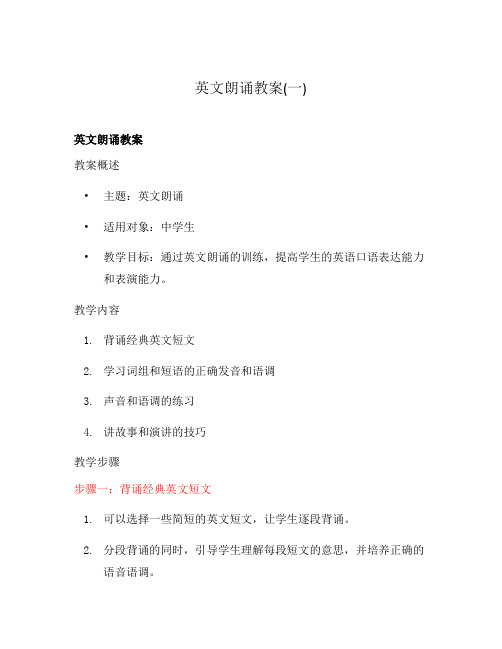
英文朗诵教案(一)英文朗诵教案教案概述•主题:英文朗诵•适用对象:中学生•教学目标:通过英文朗诵的训练,提高学生的英语口语表达能力和表演能力。
教学内容1.背诵经典英文短文2.学习词组和短语的正确发音和语调3.声音和语调的练习4.讲故事和演讲的技巧教学步骤步骤一:背诵经典英文短文1.可以选择一些简短的英文短文,让学生逐段背诵。
2.分段背诵的同时,引导学生理解每段短文的意思,并培养正确的语音语调。
3.帮助学生解析生词和句子结构,确保他们理解文本的整体意思。
步骤二:词组和短语的发音练习1.教师可以选择一些常见的词组和短语,要求学生准确地发音。
2.可以通过模仿教师的发音、对比练习等方式,帮助学生纠正发音错误,掌握正确的语音语调。
步骤三:声音和语调的练习1.引导学生意识到声音和语调在英文朗诵中的重要性。
2.练习音量的掌握,要求学生在朗读时根据需要调整声音大小。
3.练习语调的变化,帮助学生准确表达句子的感情色彩。
步骤四:讲故事和演讲的技巧1.教授学生讲故事和演讲的基本技巧,如声音、手势、面部表情等。
2.练习学生在讲故事和演讲时的自然流畅表达和舞台表现力。
教学评估1.分组进行英文朗诵比赛,评选最佳表演者和最佳朗诵内容。
2.针对学生的朗读效果和表演能力,做详细的评估及指导。
教学资源1.经典英文短文2.多媒体设备(如投影仪、音响等)3.演讲比赛评分表参考书目1.“English Pronunciation in Use” by Jonathan Marks2.“Public Speaking for Success” by Dale Carnegie以上是一份针对”英文朗诵”的教案,旨在通过切实的教学步骤和方法,提高学生的英语口语表达能力和表演能力。
通过朗诵经典英文短文、练习词组和短语的发音、练习声音和语调的技巧,以及讲故事和演讲的技巧,学生将能够更自信地运用英语,表达自己的想法和情感。
步骤五:英文朗诵实践1.组织学生进行英文朗诵实践,可以选取一些适合中学生的经典英文短文或诗歌。
高中口语短文朗读教案模板

课时:2课时年级:高中教材:《英语》教材教学目标:1. 通过朗读,提高学生对英语语音、语调的感知和表达能力。
2. 培养学生正确、流利、有感情的朗读技巧。
3. 增强学生对英语语篇的理解能力,提高综合语言运用能力。
4. 培养学生的合作意识和团队精神。
教学重点:1. 学生能够正确、流利地朗读短文。
2. 学生能够理解短文内容,并能够用英语进行简单讨论。
教学难点:1. 学生在朗读过程中能够注意语调、语速和停顿的运用。
2. 学生在理解短文内容的基础上,能够用英语进行讨论。
教学准备:1. 教师准备:短文朗读材料、PPT、多媒体设备。
2. 学生准备:准备好朗读材料,了解短文背景知识。
教学过程:第一课时一、导入1. 教师用简单的英语问候学生,引入主题。
2. 学生自由发言,分享自己感兴趣的英语短文。
二、朗读训练1. 教师播放短文录音,学生跟读,注意语音、语调。
2. 学生分组,每组选择一位代表朗读短文,其他成员进行纠正和评价。
3. 教师点评,指出学生在朗读过程中存在的问题,如语调、语速、停顿等。
三、讨论1. 教师引导学生根据短文内容进行小组讨论,提出问题。
2. 学生用英语进行讨论,分享自己的观点和感受。
3. 教师组织全班讨论,总结讨论结果。
四、总结1. 教师总结本节课的学习内容,强调朗读技巧的重要性。
2. 学生回顾自己的朗读表现,提出改进措施。
第二课时一、复习1. 教师播放短文录音,学生跟读,检查学生对短文内容的掌握情况。
2. 学生分组,进行朗读比赛,巩固朗读技巧。
二、拓展1. 教师展示与短文相关的图片或视频,引导学生进行联想和思考。
2. 学生用英语描述图片或视频内容,锻炼口语表达能力。
三、总结1. 教师对本节课的学习内容进行总结,强调英语朗读的重要性。
2. 学生分享自己的学习心得,提出对今后学习的期望。
教学反思:1. 教师在教学中应注重学生的个体差异,针对不同学生的特点进行指导。
2. 在朗读训练中,教师要关注学生的发音、语调、语速等,帮助学生提高朗读水平。
口语竞赛朗读材料
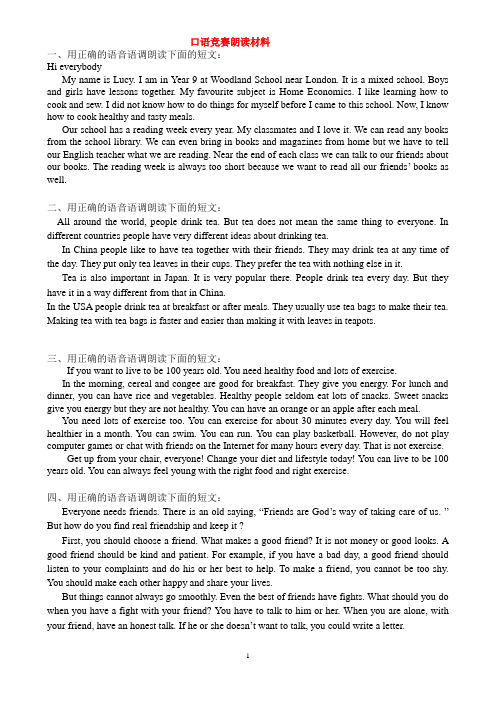
口语竞赛朗读材料一、用正确的语音语调朗读下面的短文:Hi everybodyMy name is Lucy. I am in Year 9 at Woodland School near London. It is a mixed school. Boys and girls have lessons together. My favourite subject is Home Economics. I like learning how to cook and sew. I did not know how to do things for myself before I came to this school. Now, I know how to cook healthy and tasty meals.Our school has a reading week every year. My classmates and I love it. We can read any books from the school library. We can even bring in books and magazines from home but we have to tell our English teacher what we are reading. Near the end of each class we can talk to our friends about our books. The reading week is always too short because we want to read all our friends’ books as well.二、用正确的语音语调朗读下面的短文:All around the world, people drink tea. But tea does not mean the same thing to everyone. In different countries people have very different ideas about drinking tea.In China people like to have tea together with their friends. They may drink tea at any time of the day. They put only tea leaves in their cups. They prefer the tea with nothing else in it.Tea is also important in Japan. It is very popular there. People drink tea every day. But they have it in a way different from that in China.In the USA people drink tea at breakfast or after meals. They usually use tea bags to make their tea. Making tea with tea bags is faster and easier than making it with leaves in teapots.三、用正确的语音语调朗读下面的短文:If you want to live to be 100 years old. You need healthy food and lots of exercise.In the morning, cereal and congee are good for breakfast. They give you energy. For lunch and dinner, you can have rice and vegetables. Healthy people seldom eat lots of snacks. Sweet snacks give you energy but they are not healthy. You can have an orange or an apple after each meal.You need lots of exercise too. You can exercise for about 30 minutes every day. You will feel healthier in a month. You can swim. You can run. You can play basketball. However, do not play computer games or chat with friends on the Internet for many hours every day. That is not exercise.Get up from your chair, everyone! Change your diet and lifestyle today! You can live to be 100 years old. You can always feel young with the right food and right exercise.四、用正确的语音语调朗读下面的短文:Everyone needs friends. There is an old saying, “Friends are God’s way of taking care of us. ”But how do you find real friendship and keep it ?First, you should choose a friend. What makes a good friend? It is not money or good looks. A good friend should be kind and patient. For example, if you have a bad day, a good friend should listen to your complaints and do his or her best to help. To make a friend, you cannot be too shy. You should make each other happy and share your lives.But things cannot always go smoothly. Even the best of friends have fights. What should you do when you have a fight with your friend? You have to talk to him or her. When you are alone, with your friend, have an honest talk. If he or she doesn’t want to talk, you could write a letter.五、用正确的语音语调朗读下面的短文:New York, London, Paris and some other cities are exciting places to live. There are many interesting things to see and to do . You can go to different kinds of museums, plays and films. You can also buy things from all over the world.But there are serious problems in big cities, too . It is expensive to live there, and there are too many people in some places in big cities. Every year many people move to the cities to find work, study at good schools and receive good medical care . But sometimes these people can’t find work or good places to live. Also it is hard to keep big cities safe and clean.Some people enjoy living in big cities, others do not. Before people move to a big city, they should think about the problems they might encounter there.六、用正确的语音语调朗读下面的短文:In most places in the U.S. children must attend school until sixteen, or until they finish high school, usually at the age of seventeen or eighteen. Some children who are not good students drop out of school at sixteen. This is a growing problem, for it is harder and harder for people to find work when they haven’t finished their high school education.Public schools are free to all boys and girls, but some parents prefer to send their children to private schools. Usually private schools have small classes and very good teachers, so parents think their children will get a better education there than in public schools. The government doesn’t give any money to these private schools, so most of them ask the students to pay several thousand dollars a year to pay for the cost of the school. Boys and girls go to the public schools together, but many private schools are for girls only or boys only.七、用正确的语音语调朗读下面的短文:Today many people enjoy reading stories about UFO. Many people in different countries are studying the UFO. There are some different sayings for UFO. Among those saying, the most popular one for UOF is that UFOs are strange flying objects and they carry strange creatures to the earth from other stars. We can call them aliens. UFO scientists and many people believed this saying. Some people said that they saw a few UFOs landing on the earth. They seemed to be objects rather like big plates. Some people said that they saw some strange visitors coming out of the UFOs. Some people make mistakes when they say they have seen UFOs high in the sky. Perhaps they see a weather balloon or an uncommon plane or the light they see in the sky coming from the ground. Sometimes they see the light from the moon. But there are a lot of other sayings we can’t understand. It may take many years to find a clear answer and then people will give UFO another name.八、用正确的语音语调朗读下面的短文:Robots seem very new to most people, but they have a long history. The first one was made by a Greek(希腊的) inventor. You may see robots in some films. The robots in these films are stronger, faster and cleverer than people. In real, life, most robots are used in factories. They are used to do many dangerous, difficult or boring jobs. Some people can’t look after themselves and robots are used to help them. For example, some people can’t see, so many of these people use a dog to help themselves move around. This dog is called a guide dog. Scientists are making a robot to help them. In the future, robot dogs might take the place of these guide dogs. Robots are also used in American hospitals. At one hospital, a robot takes meals from the kitchen to the sick people’s rooms. It never loses its way because it has a map of the hospital in its computer system. In the future, robots will work in space. But robots will never take the place of humans. The however, help us in a lot of different ways.。
初中英语朗诵指导教案模板
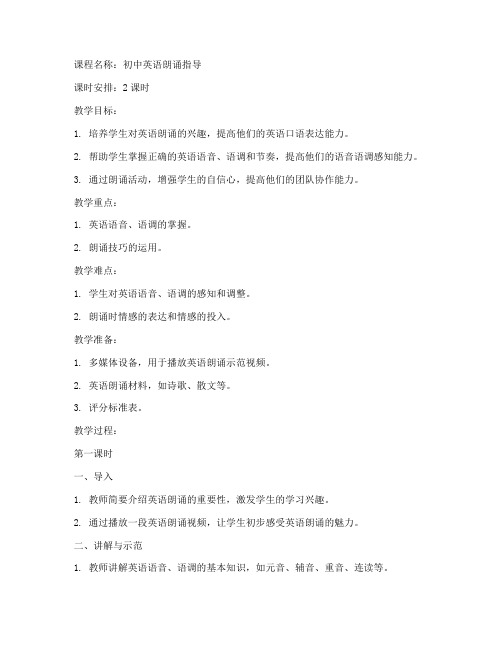
课程名称:初中英语朗诵指导课时安排:2课时教学目标:1. 培养学生对英语朗诵的兴趣,提高他们的英语口语表达能力。
2. 帮助学生掌握正确的英语语音、语调和节奏,提高他们的语音语调感知能力。
3. 通过朗诵活动,增强学生的自信心,提高他们的团队协作能力。
教学重点:1. 英语语音、语调的掌握。
2. 朗诵技巧的运用。
教学难点:1. 学生对英语语音、语调的感知和调整。
2. 朗诵时情感的表达和情感的投入。
教学准备:1. 多媒体设备,用于播放英语朗诵示范视频。
2. 英语朗诵材料,如诗歌、散文等。
3. 评分标准表。
教学过程:第一课时一、导入1. 教师简要介绍英语朗诵的重要性,激发学生的学习兴趣。
2. 通过播放一段英语朗诵视频,让学生初步感受英语朗诵的魅力。
二、讲解与示范1. 教师讲解英语语音、语调的基本知识,如元音、辅音、重音、连读等。
2. 教师示范正确的发音和朗诵技巧,如气息控制、停顿、语调变化等。
三、分组练习1. 学生分成小组,每组选取一首朗诵材料。
2. 小组成员共同讨论,确定朗诵的分工和技巧。
3. 小组成员进行朗诵练习,教师巡回指导。
四、展示与评价1. 每组派代表进行朗诵展示。
2. 教师根据评分标准表对每组进行评价,其他学生进行互评。
3. 教师对学生的朗诵进行总结和点评。
第二课时一、复习与巩固1. 教师带领学生复习上一节课所学的内容,巩固语音、语调知识。
2. 学生进行个人或小组朗诵练习,教师巡回指导。
二、拓展与提高1. 教师引入新的朗诵材料,如英语歌曲、戏剧片段等。
2. 学生分组进行朗诵练习,教师指导。
3. 学生进行朗诵展示,教师评价。
三、总结与反思1. 教师总结本节课的学习内容,强调朗诵技巧的重要性。
2. 学生进行自我反思,总结自己在朗诵过程中的优点和不足。
3. 教师针对学生的反思给予建议和指导。
教学评价:1. 学生对英语朗诵的兴趣和参与度。
2. 学生在朗诵过程中的语音、语调表现。
3. 学生对朗诵技巧的掌握程度。
朗诵课教案英语初中
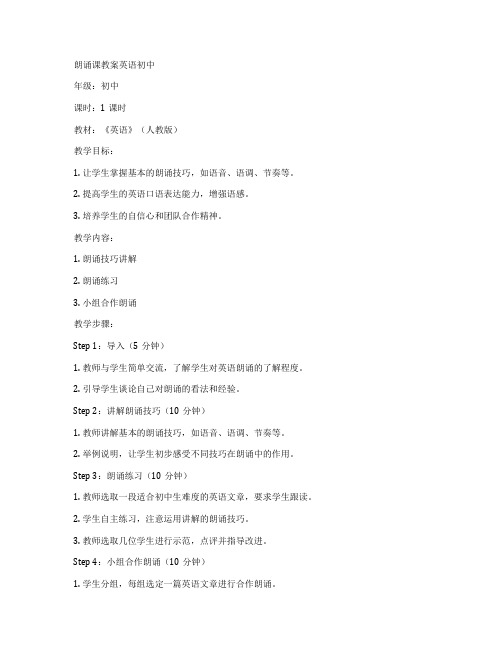
朗诵课教案英语初中年级:初中课时:1课时教材:《英语》(人教版)教学目标:1. 让学生掌握基本的朗诵技巧,如语音、语调、节奏等。
2. 提高学生的英语口语表达能力,增强语感。
3. 培养学生的自信心和团队合作精神。
教学内容:1. 朗诵技巧讲解2. 朗诵练习3. 小组合作朗诵教学步骤:Step 1:导入(5分钟)1. 教师与学生简单交流,了解学生对英语朗诵的了解程度。
2. 引导学生谈论自己对朗诵的看法和经验。
Step 2:讲解朗诵技巧(10分钟)1. 教师讲解基本的朗诵技巧,如语音、语调、节奏等。
2. 举例说明,让学生初步感受不同技巧在朗诵中的作用。
Step 3:朗诵练习(10分钟)1. 教师选取一段适合初中生难度的英语文章,要求学生跟读。
2. 学生自主练习,注意运用讲解的朗诵技巧。
3. 教师选取几位学生进行示范,点评并指导改进。
Step 4:小组合作朗诵(10分钟)1. 学生分组,每组选定一篇英语文章进行合作朗诵。
2. 学生互相交流,讨论如何运用朗诵技巧,分配角色。
3. 各组进行朗诵展示,其他学生作为观众进行评价。
Step 5:总结与反思(5分钟)1. 教师引导学生总结本节课所学的朗诵技巧。
2. 学生分享自己在练习中的收获和感受。
3. 教师对学生的表现进行点评,鼓励学生继续努力。
教学评价:1. 观察学生在朗诵练习中的表现,评估其对朗诵技巧的掌握程度。
2. 评价学生在小组合作中的参与度和合作精神。
3. 收集学生对课程的反馈,了解学生的需求和改进方向。
备注:教师应根据学生的实际情况,适当调整教学内容和步骤,以提高学生的学习兴趣和参与度。
初中英语朗读训练教案
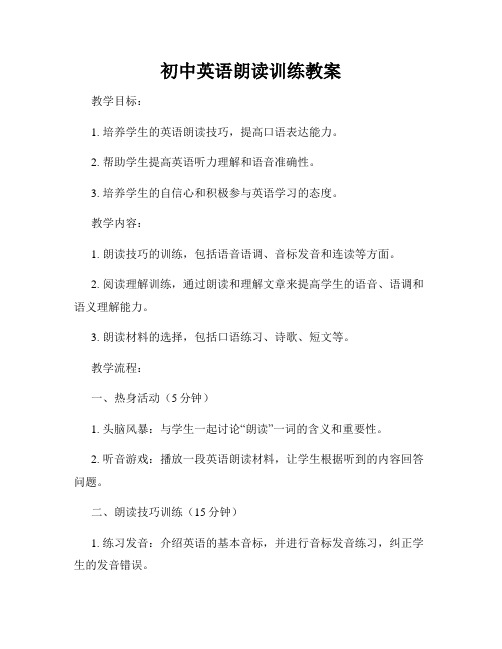
初中英语朗读训练教案教学目标:1. 培养学生的英语朗读技巧,提高口语表达能力。
2. 帮助学生提高英语听力理解和语音准确性。
3. 培养学生的自信心和积极参与英语学习的态度。
教学内容:1. 朗读技巧的训练,包括语音语调、音标发音和连读等方面。
2. 阅读理解训练,通过朗读和理解文章来提高学生的语音、语调和语义理解能力。
3. 朗读材料的选择,包括口语练习、诗歌、短文等。
教学流程:一、热身活动(5分钟)1. 头脑风暴:与学生一起讨论“朗读”一词的含义和重要性。
2. 听音游戏:播放一段英语朗读材料,让学生根据听到的内容回答问题。
二、朗读技巧训练(15分钟)1. 练习发音:介绍英语的基本音标,并进行音标发音练习,纠正学生的发音错误。
2. 练习语调:通过示范和模仿,教授英语句子的语调,并进行练习。
三、朗读材料选择(10分钟)1. 口语练习:选择一些简单的日常口语对话,让学生模仿并练习。
2. 诗歌朗读:选择一些经典的英文诗歌,让学生朗读并引导他们理解诗歌的意境。
3. 短文朗读:选择一些适合初中生的短文,让学生进行分组朗读,营造积极的学习氛围。
四、阅读理解训练(20分钟)1. 练习朗读速度:选择一篇适应学生水平的短文,让学生尝试快速阅读并正确朗读出来。
2. 理解问答:以问题形式引导学生理解刚才所读的短文,并进行问答活动。
五、朗读示范(10分钟)1. 教师给学生展示一段标准流利的英语朗读,并解释其中的技巧要点。
2. 学生跟读练习:学生进行跟读练习,教师逐一纠正他们的发音和语调。
六、朗读比赛(15分钟)1. 小组朗读比赛:将学生分为若干小组,每个小组选择一段材料进行朗读比拼。
2. 教师评选:根据音准、语调、发音等方面评选出每个小组的最佳朗读者。
七、总结和延伸(5分钟)1. 总结:回顾今天的学习内容,强调朗读的重要性和技巧要点。
2. 延伸:鼓励学生在课余时间积极参加英语朗读活动,提高自身的口语表达能力。
教学评价:1. 观察学生在朗读训练中的参与度和表现,并做记录。
英语朗读比赛教案模板范文
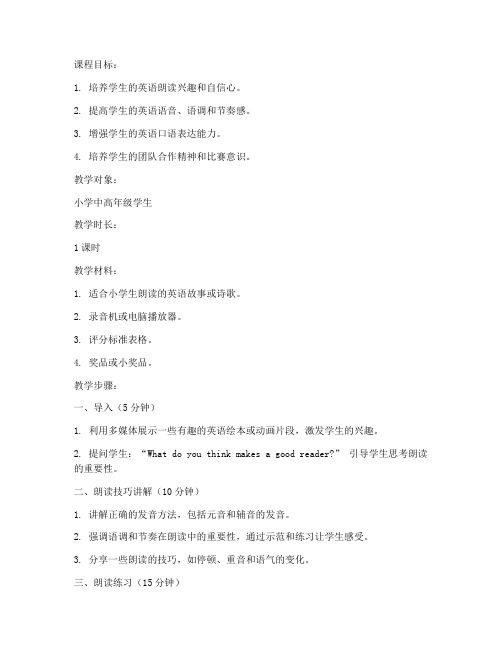
课程目标:1. 培养学生的英语朗读兴趣和自信心。
2. 提高学生的英语语音、语调和节奏感。
3. 增强学生的英语口语表达能力。
4. 培养学生的团队合作精神和比赛意识。
教学对象:小学中高年级学生教学时长:1课时教学材料:1. 适合小学生朗读的英语故事或诗歌。
2. 录音机或电脑播放器。
3. 评分标准表格。
4. 奖品或小奖品。
教学步骤:一、导入(5分钟)1. 利用多媒体展示一些有趣的英语绘本或动画片段,激发学生的兴趣。
2. 提问学生:“What do you think makes a good reader?” 引导学生思考朗读的重要性。
二、朗读技巧讲解(10分钟)1. 讲解正确的发音方法,包括元音和辅音的发音。
2. 强调语调和节奏在朗读中的重要性,通过示范和练习让学生感受。
3. 分享一些朗读的技巧,如停顿、重音和语气的变化。
三、朗读练习(15分钟)1. 将学生分成小组,每组选择一个英语故事或诗歌进行朗读练习。
2. 每组选出一名组长,负责组织小组成员的朗读练习。
3. 教师巡回指导,提供个别帮助。
四、朗读比赛准备(10分钟)1. 每组确定一位代表进行朗读比赛。
2. 学生准备比赛服装和道具,增加朗读的趣味性。
3. 教师和学生一起讨论比赛的规则和评分标准。
五、朗读比赛(20分钟)1. 比赛开始,每组代表依次进行朗读。
2. 教师和学生组成的评委团根据评分标准进行评分。
3. 学生认真聆听,感受不同朗读风格。
六、比赛结果公布及颁奖(10分钟)1. 公布比赛结果,颁发奖品。
2. 邀请获奖学生分享他们的朗读心得。
3. 对所有参赛学生给予鼓励和肯定。
七、总结与反思(5分钟)1. 教师总结本次朗读比赛的收获和不足。
2. 鼓励学生在日常生活中多进行英语朗读练习。
3. 学生分享自己的感受和收获。
教学评估:1. 观察学生在朗读比赛中的表现,评估他们的朗读技巧和表达能力。
2. 通过学生的反馈和表现,了解他们对英语朗读的兴趣和态度。
初中英语朗读课文短文教案

初中英语朗读课文短文教案教学目标:1. 学生能够朗读并理解短文内容。
2. 学生能够运用短文中的关键词汇和句型进行口语表达。
3. 学生能够通过朗读提高英语语感和发音准确性。
教学内容:1. 短文内容:介绍一个公园的设施和活动。
2. 关键词汇:公园(park),设施(facility),活动(activity),散步(walk),跑步(run),骑自行车(bike),儿童游乐场(playground),篮球场(basketball court),足球场(football field)。
3. 句型:介绍设施和活动的常用句型。
教学步骤:1. 导入:教师向学生介绍本节课要学习的短文内容,激发学生的兴趣。
2. 阅读短文:教师引导学生朗读短文,注意语音语调和发音准确性。
3. 理解短文:教师提问学生关于短文内容的问题,帮助学生理解短文。
4. 讨论:教师引导学生讨论短文中提到的公园设施和活动,鼓励学生分享自己的经验。
5. 角色扮演:学生分组,每组选择一个角色(如公园管理员、游客等),用短文中的句型和关键词汇进行角色扮演。
6. 展示:每组学生向全班展示自己的角色扮演,其他学生进行评价和反馈。
7. 总结:教师对本节课的学习内容进行总结,强调重点词汇和句型。
8. 作业:学生回家后,选择一个自己喜欢的公园或公共场所,用英语写一篇介绍设施和活动的短文。
教学评价:1. 观察学生在朗读时的语音语调和发音准确性。
2. 评价学生在角色扮演中的口语表达能力和合作能力。
3. 检查学生完成的作业,评估学生的写作能力和对短文内容的理解程度。
教学反思:本节课通过朗读、讨论、角色扮演等活动,帮助学生理解和运用短文中的关键词汇和句型。
通过作业的设置,学生能够将所学内容应用到实际情境中,提高写作能力。
在教学过程中,教师应关注学生的语音语调和发音准确性,鼓励学生积极参与课堂活动,提高口语表达能力。
同时,教师应及时给予学生反馈和指导,帮助学生提高对英语的学习兴趣和自信心。
初中英文散文诵读教案模板

课时:2课时年级:八年级教材:《初中英语》某版本教学目标:1. 学生能够通过朗读,理解散文的内容和情感。
2. 培养学生良好的英语朗读习惯,提高英语口语表达能力。
3. 增强学生的英语语感,提高英语文学素养。
教学重点:1. 散文的朗读技巧。
2. 散文内容的理解。
教学难点:1. 朗读时语音、语调、节奏的把握。
2. 散文中深层含义的理解。
教学准备:1. 散文文本。
2. 多媒体课件(包括散文内容、背景音乐、朗读示范等)。
3. 录音设备。
教学过程:第一课时一、导入1. 教师简要介绍散文的背景和作者。
2. 学生自由朗读散文,初步感知内容。
二、朗读技巧指导1. 教师示范朗读,强调语音、语调、节奏的重要性。
2. 学生跟读,教师纠正发音和语调。
3. 分组练习,互相指导。
三、内容理解1. 教师提问,引导学生理解散文的主题和情感。
2. 学生分组讨论,分享各自的理解和感受。
3. 教师总结,纠正学生的理解偏差。
四、拓展活动1. 学生朗读散文,教师评价。
2. 学生模仿散文中的角色,进行角色扮演。
3. 学生创作与散文主题相关的诗歌或短文。
第二课时一、复习导入1. 复习上一节课的内容,检查学生的朗读和内容理解情况。
2. 学生分享在拓展活动中的收获。
二、深入理解1. 教师引导学生分析散文中的修辞手法和象征意义。
2. 学生讨论散文中的文化背景和时代特点。
3. 教师总结,帮助学生深入理解散文。
三、朗读巩固1. 学生再次朗读散文,注意调整语音、语调、节奏。
2. 教师评价学生的朗读,给予指导和建议。
四、总结与作业1. 教师总结本节课的学习内容,强调散文朗读的重要性。
2. 布置作业:背诵散文中的一段,并尝试用自己的话复述散文的主要内容。
教学反思:本节课通过朗读、讨论、角色扮演等多种形式,帮助学生理解散文的内容和情感,提高了学生的英语口语表达能力和文学素养。
在教学过程中,教师应注重引导学生积极参与,鼓励学生发表自己的见解,同时关注学生的个体差异,给予个性化的指导。
初中口语教案英文模板范文
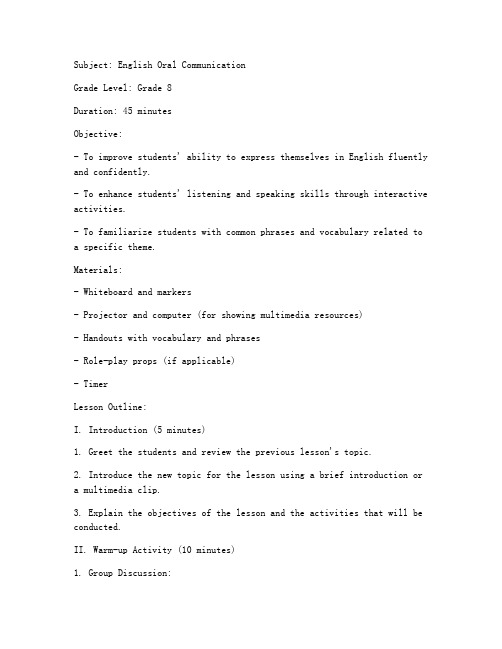
Subject: English Oral CommunicationGrade Level: Grade 8Duration: 45 minutesObjective:- To improve students' ability to express themselves in English fluently and confidently.- To enhance students' listening and speaking skills through interactive activities.- To familiarize students with common phrases and vocabulary related to a specific theme.Materials:- Whiteboard and markers- Projector and computer (for showing multimedia resources)- Handouts with vocabulary and phrases- Role-play props (if applicable)- TimerLesson Outline:I. Introduction (5 minutes)1. Greet the students and review the previous lesson's topic.2. Introduce the new topic for the lesson using a brief introduction ora multimedia clip.3. Explain the objectives of the lesson and the activities that will be conducted.II. Warm-up Activity (10 minutes)1. Group Discussion:- Divide the class into small groups.- Ask each group to discuss a question or topic related to the new theme.- Encourage students to use new vocabulary and phrases learned in the previous lesson.- Monitor and provide feedback where necessary.2. Vocabulary Review:- Present new vocabulary and phrases related to the theme.- Use visual aids or gestures to help students understand the meanings.- Have students practice using the new vocabulary in sentences.III. Main Activity (20 minutes)1. Listening Activity:- Play a short audio clip or video related to the theme.- Pause the clip at certain points and ask students to summarize what they have heard.- Encourage students to ask questions and share their interpretations.2. Speaking Activity:- Conduct a role-play activity where students act out a scenario related to the theme.- Assign roles and provide props or scripts if necessary.- Monitor the activity and provide feedback on pronunciation, fluency, and content.3. Interactive Game:- Organize a game that promotes speaking and listening, such as "Two Truths and a Lie" or "Simon Says."- Use English commands and encourage students to respond in English.IV. Consolidation (10 minutes)1. Reflection:- Ask students to reflect on what they have learned during the lesson.- Encourage them to share their experiences and any challenges they faced.2. Homework Assignment:- Assign a speaking or listening homework that reinforces the theme of the lesson.- Provide guidelines and expectations for the homework.V. Conclusion (5 minutes)1. Summarize the key points of the lesson.2. Provide positive feedback and acknowledge students' participation and efforts.3. Thank the students for their attention and dismiss the class. Assessment:- Observe students' participation in activities and assess their speaking and listening skills.- Collect and review the homework assignments to assess students' understanding and application of the new vocabulary and phrases.Note:- Adjust the duration of activities based on students' needs and the class's pace.- Be flexible and responsive to students' feedback to ensure a successful learning experience.。
初中美文朗读英语教案模板
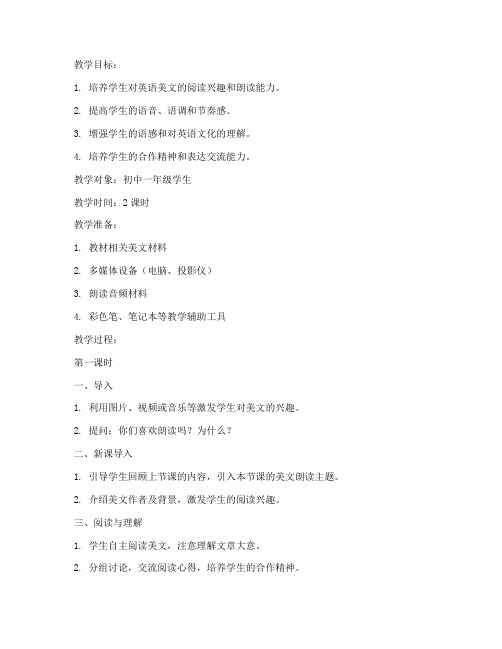
教学目标:1. 培养学生对英语美文的阅读兴趣和朗读能力。
2. 提高学生的语音、语调和节奏感。
3. 增强学生的语感和对英语文化的理解。
4. 培养学生的合作精神和表达交流能力。
教学对象:初中一年级学生教学时间:2课时教学准备:1. 教材相关美文材料2. 多媒体设备(电脑、投影仪)3. 朗读音频材料4. 彩色笔、笔记本等教学辅助工具教学过程:第一课时一、导入1. 利用图片、视频或音乐等激发学生对美文的兴趣。
2. 提问:你们喜欢朗读吗?为什么?二、新课导入1. 引导学生回顾上节课的内容,引入本节课的美文朗读主题。
2. 介绍美文作者及背景,激发学生的阅读兴趣。
三、阅读与理解1. 学生自主阅读美文,注意理解文章大意。
2. 分组讨论,交流阅读心得,培养学生的合作精神。
3. 教师针对文章中的难点进行讲解,帮助学生理解。
四、朗读技巧训练1. 教师示范朗读,讲解朗读技巧,如语音、语调、节奏等。
2. 学生跟读,模仿教师的朗读方式。
3. 学生分组朗读,互相评价,提高朗读水平。
五、总结与拓展1. 学生总结本节课所学到的朗读技巧。
2. 教师引导学生进行朗读拓展,如改编文章、创作朗读剧本等。
第二课时一、复习导入1. 复习上节课所学的朗读技巧。
2. 学生朗读展示,教师点评。
二、朗读实战演练1. 学生分组,每组选取一篇美文进行朗读。
2. 教师巡回指导,纠正学生的朗读错误。
3. 各组进行朗读比赛,评选出最佳朗读小组。
三、朗读技巧提高1. 教师针对比赛中出现的问题进行讲解,提高学生的朗读水平。
2. 学生再次朗读,尝试运用所学技巧。
四、总结与反思1. 学生总结本节课所学到的朗读技巧。
2. 教师引导学生反思自己的朗读表现,提出改进措施。
五、课后作业1. 学生选取一篇美文,进行朗读练习。
2. 家长监督学生完成作业,并对学生的朗读进行评价。
教学评价:1. 学生对美文的阅读兴趣和朗读能力是否有所提高。
2. 学生在朗读比赛中表现出的合作精神和表达交流能力。
初中英语作文诵读教案模板
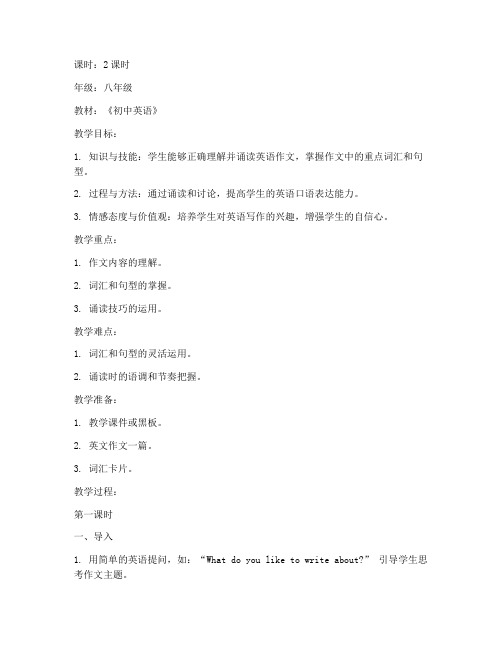
课时:2课时年级:八年级教材:《初中英语》教学目标:1. 知识与技能:学生能够正确理解并诵读英语作文,掌握作文中的重点词汇和句型。
2. 过程与方法:通过诵读和讨论,提高学生的英语口语表达能力。
3. 情感态度与价值观:培养学生对英语写作的兴趣,增强学生的自信心。
教学重点:1. 作文内容的理解。
2. 词汇和句型的掌握。
3. 诵读技巧的运用。
教学难点:1. 词汇和句型的灵活运用。
2. 诵读时的语调和节奏把握。
教学准备:1. 教学课件或黑板。
2. 英文作文一篇。
3. 词汇卡片。
教学过程:第一课时一、导入1. 用简单的英语提问,如:“What do you like to write about?” 引导学生思考作文主题。
2. 展示一篇英文作文,让学生先阅读,然后提出问题,引导学生猜测作文内容。
二、新课导入1. 介绍作文的主题和背景,让学生对作文有一个初步的了解。
2. 分组讨论作文中的生词和短语,让学生尝试用英语解释。
三、诵读指导1. 播放课文录音,让学生跟读,注意语调和节奏。
2. 分段诵读,每组负责一段,确保每个学生都有机会参与。
3. 针对重点词汇和句型,进行重点讲解和示范。
四、讨论与练习1. 学生分组讨论作文内容,分享自己的理解和感受。
2. 进行角色扮演,让学生运用所学词汇和句型进行对话。
3. 选取作文中的重点句型,让学生进行仿写练习。
五、总结与作业1. 总结本节课的重点内容,强调词汇和句型的运用。
2. 布置作业:背诵课文,并尝试用所学句型写一篇短文。
第二课时一、复习1. 回顾上节课的重点内容,检查学生的背诵情况。
2. 让学生朗读课文,检查学生的诵读技巧。
二、拓展与提高1. 展示与课文主题相关的其他英文作文,让学生进行对比阅读。
2. 讨论作文中的写作技巧,如:如何运用过渡词、如何组织段落等。
三、课堂活动1. 进行作文写作比赛,让学生在规定时间内完成一篇作文。
2. 评选优秀作文,让学生分享自己的写作心得。
- 1、下载文档前请自行甄别文档内容的完整性,平台不提供额外的编辑、内容补充、找答案等附加服务。
- 2、"仅部分预览"的文档,不可在线预览部分如存在完整性等问题,可反馈申请退款(可完整预览的文档不适用该条件!)。
- 3、如文档侵犯您的权益,请联系客服反馈,我们会尽快为您处理(人工客服工作时间:9:00-18:30)。
二A In western countries, using eye contact in conversation is very important. If you do not use eye contact, Westerners may think that you are not listening. And if you look away, they may also think that you are lying.
2016年斗门区“口语100”杯 中学生英语口语比赛
一luntary work in a children’s hospital. The children there all suffer from serious illnesses. We organized a painting competition for them. I met a girl called Cindy. She wanted to paint a picture of the park near her home. I went there and took some photos of it. Cindy used them for her painting.
Not using eye contact can cause problems, but using too much is not polite either. In many countries, watching other people, especially strangers, for a long time is impolite. This may make them feel nervous.
二B Films are everywhere. We see famous film stars in newspapers and on TV every day. Many young people like to go to the cinema, and a new film is often an important social event. There are film festivals in many big cities and some schools have their own film clubs. Films are certainly important for many teenagers. They often tell an exciting or fantastic story and they can give people a lot of pleasure. Films can also tell a complete story in just a couple of hours. So they are useful if you don’t have time to read a very long book! Sometimes they are also important to help young people learn new information. Films can help us understand the culture of our society or of anther country’s society. Many students in China like to watch foreign films to help them improve their English, for example, or to understand their foreign friends better.
一B I’ve been in an Australian school for just over three weeks. I’m here as an educational exchange student of my school in China. I’ve noticed that Australian people and Chinese people have very different ideas about education. In China, students are often very quiet in class. They don’t think that it is impolite to disturb the teacher or to shout out answers to questions. My Australian classmates have the opposite ideas. They are often quite loud in class and like to give opinions to the teacher. At first I felt a bit shy about speaking English in front of so many people. I was worried that I might say something silly. Although it’s been hard for me, I’ve realized that this is simply the way people are in Australia.
There are many children without parents. I met some
of these children with my mother. We taught them to tell stories. This helps them express their feelings. One child said, “my friends don’t understand my pain.” We spent time with a girl called Vivien. Her parents died in a car accident, and she is unhappy and very lonely. She needs friendship. My mother and I will continue to visit Vivien.
However, in many Asian countries, looking down when talking with an older person, like a teacher or a parent, is polite. These differences can cause problems. For example, an Asian person might look down while listening to a Western speaker. The Western speaker might think this person is not interested in what he or she is saying.
